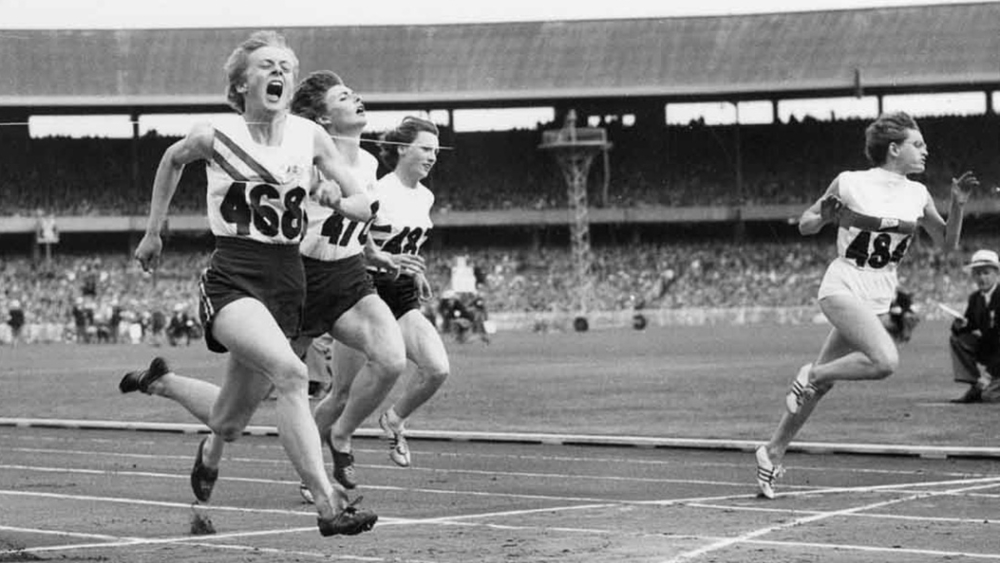The late Betty Cuthbert has been honoured with the highest Australia Day honour – the Companion of the Order of Australia – for “eminent service to athletics at the national and international level, particularly as a gold medallist at the Melbourne and Tokyo Olympic Games.”
She was also honoured for her work as a “role model, fundraiser, and advocate for research into a cure for multiple sclerosis.”
A Christian for the last 32 years of her life, Betty said, “My salvation was a free gift. I didn’t have to work for it and it’s better than any gold medal that I’ve ever won.”
Betty died in August 2017 after a long battle with multiple sclerosis.
Betty Cuthbert, Athlete.
Born Merrylands, NSW, April 20, 1938. Died, Mandurah, Western Australia, August 6, 2017, aged 79.
Australia’s greatest track and field athlete, Betty Cuthbert, felt it was God calling her to run again when she made a comeback at the 1964 Olympic Games.
Betty, who died on Sunday at the age of 79 in a Western Australian nursing home, had sprinted her way into history at the 1956 Olympic Games at the age of just 18.
Dubbed the Golden Girl because of her blonde bob, she streaked to victory in the 100m, the 200m and the 4 x 100m relay – becoming the first Australian, male or female, to win three gold medals at a single Olympics.
But despite being at peak fitness for the 1960 Rome Games, it all came apart when a hamstring injury during the heats forced the young athlete to withdraw. She retired from running.
Betty heard an inner voice nagging at her, “Run again, run again”
She was so resolved not to run again that when she heard an inner voice nagging at her, “Run again, run again”, she kept resisting it. But eventually she trusted that the voice was from God and began training, this time for the 400m.
Her comeback race at the Tokyo Olympics Games was the most satisfying of a career that included nine world records. At age 26, she ran a flawless 400m race to win her fourth gold medal – the only Australian track and field athlete to have won four gold medals.
She described that race as “the only perfect race I have ever run”, but she attributed the victory to God.
“I knew I had to do it; I knew I would win.” – Betty Cuthbert
“I didn’t win any of the heats or the semi-final, but on the day of the final I was lying on a bench before the race,” she said in a 2001 interview.
“When we were called for the start, it was as if some force got me up from the bench. Amazingly, I had no nerves and I wasn’t worried at all. During the race, the wind was quite tricky and the other competitors were running very strongly, yet I was still very calm. I knew I had to do it; I knew I would win.”
Betty believed it was this race that made her career more indelible in people’s minds. She also believed it was God’s way of giving her greater opportunity to witness for Jesus Christ.
“I now know why I had to run again and win that fourth gold medal, to make a mark in people’s minds,” explained Betty about the famous race. “He is now using my situation to tell people about him. We truly have a great God.”
“I can remember experiencing God in all that I saw around me.” – Betty Cuthbert
Betty knew from the age of eight that God had had given her the ability to run fast. Born in 1938, she grew up in a plant nursery in Sydney, where she loved running around barefoot between the rows of plants.
“Even at that age, I can remember experiencing God in all that I saw around me. I’ve always loved God, his creation, the plants, the trees and the animals,” she said.
However, it was only after she developed multiple sclerosis in her 30s that she saw God’s plan unfold. “I was encouraged to go to a particular church where someone said, ‘They’ll heal you’. Well, I wasn’t healed but I met ‘The Healer’.’”
“… It’s better than any gold medal that I’ve ever won.” – Betty Cuthbert
At age 47, Betty was “born again”. She said: “My life has never been the same since. My salvation was a free gift. I didn’t have to work for it and it’s better than any gold medal that I’ve ever won. Before then, I’m ashamed to say, I was frightened to tell people of my belief in God.”
Betty’s most prominent public appearance in recent years was in her wheelchair during the spectacular final torch bearing, at the opening ceremony of the 2000 Sydney Olympics.
In subsequent years she crossed the continent many times, mostly for Olympic functions, such as the 50th anniversary of the 1956 Melbourne Games, but also for events aimed at stimulating research into MS. She also travelled to Christmas Island to meet Vietnamese Christian refugees, and to New Zealand for Olympic-themed events.
Although Cuthbert lived independently for many years, supported by her friend Rhonda Gillam, she moved into a nursing home in Mandurah, south of Perth, in 2009. In recent years, Betty was barely able to move her head or speak.
Rhonda was with her on her last night, holding her hand and providing comfort.
“It’s sad but it’s a wonderful relief for Betty,” Rhonda told News Corp.


